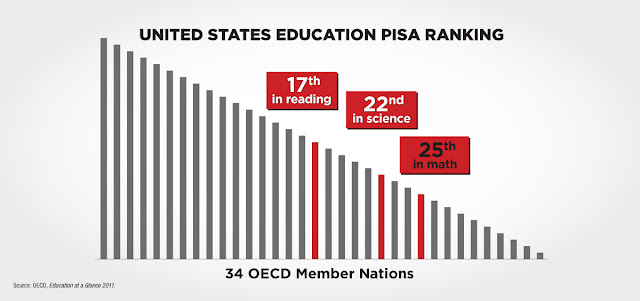As recently as 20 years ago, HistoryNet tells us, the United States led the world in high school and college education.
However, the American education system has lost ground. That is not to say that there are no schools or school systems that are doing well, or that no students are learning. But the U.S. standing among nations of the world has fallen to a frightening degree over the last several years.
“Every American family needs to open The Nation’s Report Card [the 2019 National Assessment of Educational Progress] this year and think about what it means for their child and for our country’s future,” said Secretary of Education Betsy DeVos. “The results are, frankly, devastating. This country is in a student achievement crisis, and over the past decade it has continued to worsen, especially for our most vulnerable students.”
Her warning didn’t end there. "Two out of three of our nation’s children aren’t proficient readers. In fact, fourth grade reading declined in 17 states and eighth grade reading declined in 31,” she said. “The gap between the highest and lowest performing students is widening, despite $1 trillion in Federal spending over 40 years designated specifically to help close it.”
The Atlantic magazine reported on a 2001 study by the Brookings Institute which, in fact, showed that international students found their U.S. classes “much easier” than classes in their home country. That number rose from nearly 60 percent of foreign students in 2001 to 66.4 percent in a 2016 study.
The Organization for Economic Co-operation and Development (OECD) administers an exam every three years. It is considered the gold standard for such data. The most recent available results from the exam, titled the Program for International Student Assessment (PISA), is from 2015. PISA measures reading, math and science in 15-year-olds in 72 countries every three years.
** The U.S. ranked 18th in Reading. The top five were: Singapore, Ireland, Canada, Hong Kong, and Japan.
** The U.S ranked 36th in Math, with the top five being: Singapore, Hong Kong, Chinese Taipei, Macau (China), Japan.
** And we ranked 22nd in Science, with the leaders being: Singapore, Japan, Estonia, Chinese Taipei, Canada.
The U.S. scored just above the average of all nations in reading and science, and below average in math. East Asian and northern European countries tend to dominate the exam.
Among the most advanced countries, the U.S. ranks 38th out of 40 in graduating science majors, according to the 2015 Science, Technology and Industry Scoreboard report from the OECD.
And America is way behind China and India in STEM (Science, Technology, Engineering and Mathematics) graduates, the academic areas our future depends upon to a great degree.
“China had at least 4.7 million recent STEM grads as of 2016; India had 2.6 million as of 2017; the U.S. pulls in at third at 568,000,” according to the World Economic Forum. In terms of graduates per thousand population, the U.S. is about even with India with one grad per 573 people, but far behind China with one grad per 293 people.
Being challenged by China, our leading economic competitor, is a serious problem. Will we have enough future engineers and scientists to protect our lead in high technology fields, or will we be replaced by the Chinese?
Business Insider worries that “While American scientists still publish more papers than their international counterparts, and American companies still register more patents, not nearly enough students are graduating with degrees in STEM fields to keep pace with the rest of the world.”
The reasons for America’s declining educational performance are many and varied. Some are systemic. Some are cultural. Some are political.
The Brookings report also reflected that foreign students also say that American students spend far more time on sports than on academics.
“Nearly two-thirds of foreign-exchange students in the United States view American teenagers as placing a much higher value on athletic success than teens in their home countries do,” Brookings reported. “By comparison, only 5 percent of international students say American teens place a much higher value on success in mathematics than teenagers abroad. Around 65 percent of foreign-exchange students also feel that American teens spend less time on homework than their international peers.”
Standardized testing is a frequent target for blame. By placing so much attention on performance on these tests, it is argued, much class time and other resources that could be put to better use is wasted, and students learn what they need for the test, to the detriment of broader and deeper learning of subject matter.
Another area of criticism is the implementation of the Common Core State Standards. Common Core was heralded as “dramatically improving teaching and learning” and, indeed, “transforming education for every child.” It hasn’t. The Hill commented, “Under the suffocating hand of Common Core, true academic achievement is withering.”
The late Joseph Sobran years ago wrote, “In 100 years we have gone from teaching Latin and Greek in high school to teaching remedial English in college.”
We have replaced so many of the concepts that made us strong for “newer and better ideas,” and now we are paying the price.


No comments:
Post a Comment